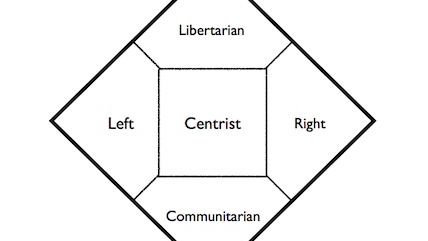Reason-Rupe Ideological Typology: Where Do You Fit?

The latest Reason-Rupe survey used a three-question screen to glean Americans' predispositions toward government. Many Americans are unclear which ideological label best describes their views about government, and many feel the traditional labels don't fit them. For instance, some may feel they agree with Republicans on economics but with Democrats on social issues. Or others may agree with Democrats on the role for government, but side with Republicans on social issues.
Consequently, Reason-Rupe asked three questions to measure Americans' preferred level of government involvement in economic and personal affairs respectively:
- Please tell me which of the following statements comes closer to your own opinion: We need a strong government to handle today's complex economic problems; or, people would be better able to handle today's problems within a free market with less government involvement.
- Some people think the government should promote traditional values in our society. Others think the government should not favor any particular set of values. Which comes closer to your own view?
- If you had to choose, would you rather have a smaller government providing fewer services, or a larger government providing more services?
Reason-Rupe identified five political groupings according to the following rubric:
- Conservative—19%: Those who favor smaller government, free market solutions, and government promoting traditional values.
- Middle—35%: Provided mixed responses that did not consistently fit with one of the other four groups.
- Libertarian—16%: Those who also favor smaller government and free market solutions, but say government should not promote a particular values set.
- Liberal—16%: Those who favor strong government to problems and a larger government providing more services, and also say government should not promote a particular values set.
- Communitarian—14%: Those who also favor strong and larger government providing more services, but favor government promoting traditional values.
To be sure, these typologies are different than respondents' self-described views. Reason-Rupe found that 28 percent of Americans self-identify as conservative, 24 percent as moderate, 15 percent as liberal, 5 percent as libertarian, 10 percent as progressive, 12 percent as something else, and 6 percent did not know.
Certainly, using only three questions to categorize people's political views has its limitations. However, the benefit of using this particular three-question screen is that these are commonly asked questions and can be more easily included on surveys on a consistent basis.
Editor's Note: As of February 29, 2024, commenting privileges on reason.com posts are limited to Reason Plus subscribers. Past commenters are grandfathered in for a temporary period. Subscribe here to preserve your ability to comment. Your Reason Plus subscription also gives you an ad-free version of reason.com, along with full access to the digital edition and archives of Reason magazine. We request that comments be civil and on-topic. We do not moderate or assume any responsibility for comments, which are owned by the readers who post them. Comments do not represent the views of reason.com or Reason Foundation. We reserve the right to delete any comment and ban commenters for any reason at any time. Comments may only be edited within 5 minutes of posting. Report abuses.
Please to post comments


Wait a minute:
"Some people think the government should promote traditional values in our society. Others think the government should not favor any particular set of values. Which comes closer to your own view?"
You left out a third group - the people who think government should actively work to undermine traditional values.
I'm trying to rephrase that in a way that fits the ideological Turing test. How about: "The government should take an active role in rooting out outdated social norms which keep women, LGBTQ and minorities down."
Question 2 is astonishingly biased. There are three groups, not two. Group one is those (rare, rare) individuals who think the government shouldn't attempt to legislate morality, period. Then there is a second group that wishes the government to impose "traditional" morality on all and sundry. I'd say at this point it is mostly fighting a rear guard action. And then there is a third group that wishes the government to legislate "progressive" morality.
Ignoring the third group, as your question does, is incomprehensible. The list of progressive "values" that activists have enacted and are trying to enact into law seems almost endless.
The political scene is far more dominated by those who are trying to use the government to REQUIRE BY LAW progressive values, speech, and behavior. We are all in far more danger of having our freedom limited by progressive ideologues than by any conservative efforts along those lines.
If you're planning on using these three questions repeatedly in polling, perhaps you should revise them to be less biased. As it is, question #2 are nothing but embodied left wing propaganda; the plucky leftist underdog fighting for individual freedom against the forces of conservative morality. BOSH. Leftists fought for individual freedom for exactly as long as they weren't in the position to start imposing their own values on everyone else by force. At that exact point they abandoned any pretense of interest in individual liberty and started legislating progressive morality as fast as they could.
Communitarian - that's the scariest of 'em all